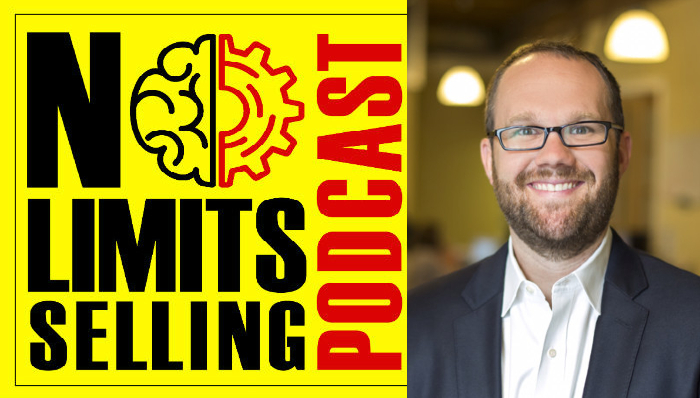Fostering a Culture of Continuous Learning by Tom Ainsley
On Episode 19 of The No Limits Selling Podcast, we have Tom Ainsley, CEO & Strategy Lead at Ainsley & Co. Tom works with CEOs, business owners, and VP’s of Marketing and HR to generate leads, grow their business, recruit top talent, and tell their organization’s story.
We’re hired to move the needle. We establish performance metrics for your KPI's, and launch campaigns that create the outcomes our clients need.
At Ainsley & Co. I lead a team of consultants and creatives that help our clients with branding, digital marketing, website design, internal communications and employee engagement, recruitment, video production, content marketing, social media marketing, public relations and advertising.
We start by studying our clients’ business, their markets, and identifying ways to help them connect with their customers and employees in unique, game-changing ways. We then build the tools they need to succeed and execute marketing campaigns that deliver results.
Specialties: Marketing Strategy, Website Design and Development, Media Planning and Buying, Video Production, Branding and Identity, Inbound Marketing, Sales Collateral Design, Social Media Marketing, Email Marketing
Podcast Highlights:
- Passion First – Find what you love then build a company around it
- Adapt or Die – Always remain relevant to your customers
- Culture is King – Employees stay for the culture, not the paycheck
- Day One – The day you get a client is the day you start losing them

Contact Tom:
[EDITOR’S NOTE: This podcast is sponsored by No Limits Selling. It is a fun, fast-paced podcast that delivers hard-fought business advice that you can implement today to improve your sales and performance]
Interested In Our Real Estate Coaching Services? Explore Our Website: Link
Feeling Not Well Today? You Can Use Our Mindset Boosters App To amp Up Your Mood: Link
Find us on Social Media:
LinkedIn | Facebook community | Instagram
Like what do you listen to? Subscribe to our podcast!
Ready to become fearless? We can help you become fearless in 60 days so you accomplish more in your career Schedule A 15 min Call with Umar
Summary
Introduction and Background
The podcast begins with Umar Hameed introducing Tom Ainsley, the CEO of Ainslie and Company. Tom shares his background and the journey of his marketing agency, which started as Baltimore Media Group in 2010. His firm is a catalyst for companies looking to grow, assisting them in achieving their growth goals, whether it's revenue growth, geographic expansion, new product launches, mergers and acquisitions, or recruitment.
The Shift from Salesperson to Entrepreneur
Tom discusses his transition from being a top salesperson at a local radio station to starting his own agency. This decision was influenced by a "come to Jesus" moment following the birth of his first child. He was inspired by an event featuring Gary Vee, which led him to quit his job and start his own agency, despite the financial risks involved.
Leadership and Employee Development
Tom emphasizes the importance of leadership in his role, particularly in terms of predicting future trends and implications. He also highlights the importance of putting employees first, fostering a culture of continuous learning, and providing personal development opportunities. He believes in giving employees a budget to learn anything they want, whether it's related to their work or not, to instill a continuous learning mentality.
Culture of Continuous Learning
Tom Ainsley explores the transformative power of fostering a learning environment within an organization. Ainsley delves into the significance of encouraging employees to continuously seek knowledge, adapt to new challenges, and grow both personally and professionally.
He emphasizes that a culture of continuous learning is not just about professional development; it is a fundamental philosophy that can drive a company's success. By promoting a mindset of curiosity and openness, Ainsley argues that organizations can not only retain top talent but also stay ahead in today’s rapidly evolving business landscape.
Challenges and Growth
Tom shares a pivotal moment in the growth of his company when they lost a significant client. He explains that losing a client doesn't necessarily mean the agency did something wrong. Instead, it's an opportunity to adapt and evolve the services they offer based on what the client needs and where they can deliver value.
Conclusion
In conclusion, the podcast with Tom Ainsley, CEO of Ainslie and Company, offers valuable insights into the journey of an entrepreneur, the importance of leadership, and the significance of continuous learning in a company's culture. Tom's transition from a top salesperson to the founder of a successful marketing agency demonstrates the courage to take risks and the determination to follow one's passion.
His leadership style, which emphasizes predicting future trends and fostering employee development, serves as an inspiring model for other leaders. Despite the challenges faced, such as losing a significant client, Tom views these as opportunities for growth and adaptation. The podcast serves as a testament to the power of resilience, continuous learning, and effective leadership in the world of business.
Questions & Answers
Who is Tom Ainsley and what is his company about?
What inspired Tom Ainsley to transition from a salesperson to an entrepreneur?
What is Tom Ainsley's approach to leadership and employee development?
How does Tom Ainsley view challenges and growth in his company?
What are the key takeaways from the podcast with Tom Ainsley?
Don’t miss this opportunity to transform your real estate career with one-on-one coaching. As an experienced real estate coach, I, Umar Hameed, am dedicated to helping you unlock your full potential and achieve your real estate goals. To learn more about who am I and my clients ↓
If you’re ready to take the next step, book an appointment with me today and begin your journey toward success in the real estate industry.
